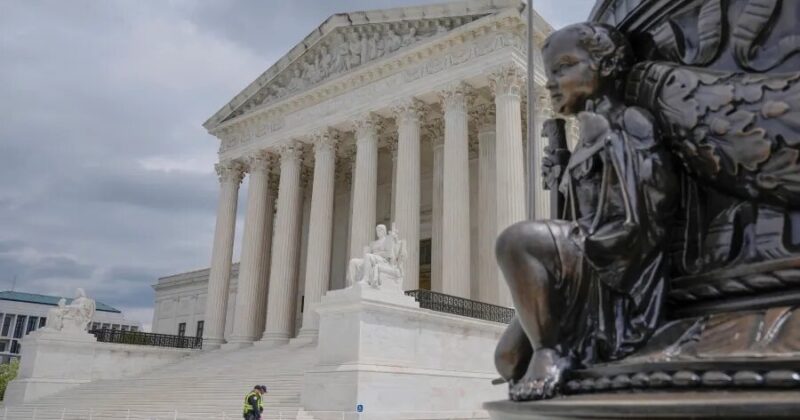The Supreme Court issued a 6-3 decision against an illegal alien who sought a visa to remain in the United States, following a denial based on accusations of being a member of MS-13 gang.
In 2010, Sandra Munoz, a U.S. citizen, married Luis Asencio-Cordero, who was ilegally present in the U.S. from El Salvador. Munoz then submitted a petition to the U.S. Citizenship and Immigration Services (USCIS) to classify Asencio-Cordero as an immediate family member, aiming to enable him to apply for a visa and reside with her in the United States.
After USCIS approved Munoz’s petition, Asencio-Cordero traveled to his native El Salvador to apply for a visa at a consular office. Asencio-Cordero underwent several interviews and was denied a visa on the grounds that he sought entry to the U.S. solely to engage in criminal activity.
Asencio-Cordero believed his visa was rejected because of his alleged ties to the violent MS-13 gang based in El Salvador. He also believed his visa denial was linked to a tattoo he has that indicates membership in the gang.
Asencio-Cordero and Munoz then sued the State Department, alleging that Munoz had a right to live in the U.S. with her spouse under the Fifth Amendment and that by depriving her husband of a visa, she is owed due process to challenge in the courts the rejection of his visa application.
On Friday, Justice Amy Coney Barrett authored the majority opinion, stating that “a[n] [American] citizen does not have a fundamental liberty interest in her noncitizen spouse being admitted to the country.”
Barrett writes:
Here, Muñoz invokes the “fundamental right to marriage,” but she actually claims something more distinct: the right to reside with her noncitizen spouse in the United States.
That involves more than marriage and more than spousal cohabitation — it includes the right to have her noncitizen husband enter (and remain in) the United States. As Muñoz asserts it, she claims “a marital right . . . sufficiently important that it cannot be unduly burdened without procedural due process as to an inadmissibility finding that would block her from residing with her spouse in her country of citizenship.”
So described, the asserted right is fundamental enough to be implicit in “liberty;” but, unlike other implied fundamental rights, its deprivation does not trigger strict scrutiny.
…
From this Nation’s beginnings, the admission of noncitizens into the country was characterized as “of favor [and] not of right.”
And when Congress began to restrict immigration in the late 19th century, the laws it enacted provided no exceptions for citizens’ spouses.
And while Congress has, on occasion, extended special immigration treatment to marriage … it has never made spousal immigration a matter of right.
…
Muñoz’s claim to a procedural due process right in someone else’s legal proceeding would have unsettling collateral consequences. Her position would usher in a new strain of constitutional law — one that prevents the government from taking actions that “indirectly or incidentally” burden a citizen’s legal rights.
To be sure, Muñoz has suffered harm from the denial of Asencio-Cordero’s visa application, but that harm does not give her a constitutional right to participate in his consular proceeding.
Earlier, the District Court had supported the State Department’s position in the matter. However, the Ninth Circuit overturned the decision and sent the case back for further review, ruling that Munoz had a constitutionally protected right concerning Asencio-Cordero’s visa application.
“The Ninth Circuit is the only Court of Appeals to have embraced this asserted right — every other Circuit to consider the issue has rejected it,” Barrett writes.
“Today, we resolve the open question … we hold that a citizen does not have a fundamental liberty interest in her noncitizen spouse being admitted to the country.”
Barrett was joined by Chief Justice John Roberts, as well as Justices Clarence Thomas, Samuel Alito, and Brett Kavanaugh. Justice Neil Gorsuch filed a concurring opinion. Justices Sotomayor filed a dissenting opinion, joined by Justices Kagan and Jackson.
Share your thoughts by scrolling down to leave a comment.


It seems that some on the SCOTUS play the game of pick a side and stay on it instead of following the law of the land. In other words their mind is already made up, do not confuse me with those stinking laws!!!!!!